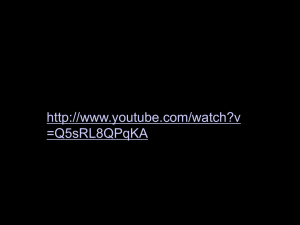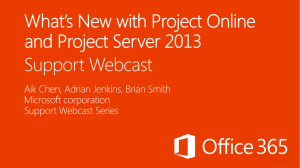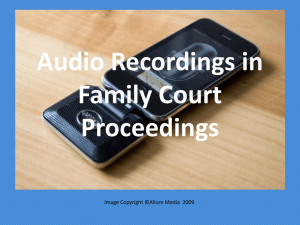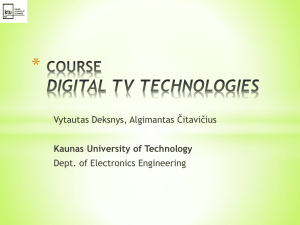Recording Classroom Lectures - MnSCU Copyright
advertisement
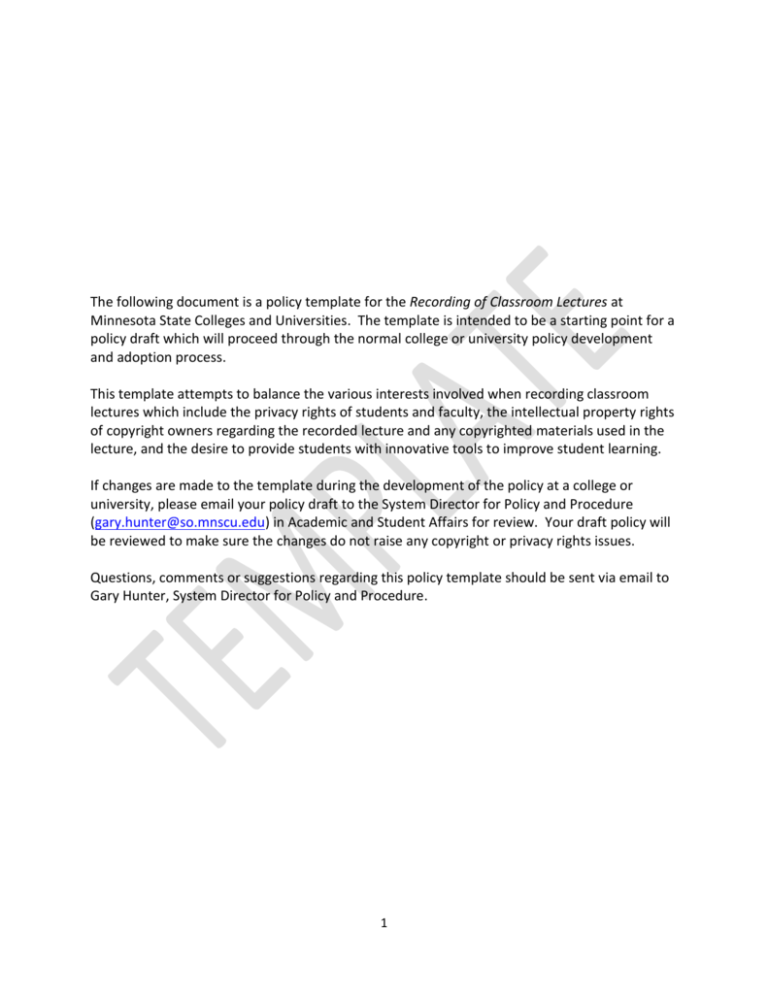
The following document is a policy template for the Recording of Classroom Lectures at Minnesota State Colleges and Universities. The template is intended to be a starting point for a policy draft which will proceed through the normal college or university policy development and adoption process. This template attempts to balance the various interests involved when recording classroom lectures which include the privacy rights of students and faculty, the intellectual property rights of copyright owners regarding the recorded lecture and any copyrighted materials used in the lecture, and the desire to provide students with innovative tools to improve student learning. If changes are made to the template during the development of the policy at a college or university, please email your policy draft to the System Director for Policy and Procedure (gary.hunter@so.mnscu.edu) in Academic and Student Affairs for review. Your draft policy will be reviewed to make sure the changes do not raise any copyright or privacy rights issues. Questions, comments or suggestions regarding this policy template should be sent via email to Gary Hunter, System Director for Policy and Procedure. 1 [College/University Name] Policy: Recording Classroom Lectures Purpose To improve student learning and retention while respecting the intellectual property and privacy rights of faculty and students. Application This policy applies to all faculty members who voluntarily agree to the record their classroom lectures at [College or University Name] and students accessing, participating in, or making an authorized recording of a classroom lectures. Background This policy addresses recorded classroom lectures in the similar manner as course materials developed by faculty members. Pursuant to Board Policy 3.26 Intellectual Property, faculty members typically own their scholarly work which includes the course materials they develop. This policy also seeks to preserve a balance of intellectual property and privacy rights of the faculty member, the privacy rights of the students present in the classroom and the educational goals of [College or University Name]. Definitions Classroom Lecture: Classroom lectures are lectures provided by a faculty member in his or her role as an instructor in a classroom or classroom type setting as part of a course with enrolled students. Public Lecture: Public lectures are typically open to the public and a speaker presents in his or her professional capacity as a scholar or expert, rather than as an instructor as part of a course. Recording: The capturing of any part or the entire amount of a classroom lecture including the audio, video, or pictorial portions of the lecture. Student Participation: Students will be deemed “participating” in a classroom lecture if their image or voice is captured in the recording. 2 Policy Recording Classroom Lectures Faculty members may voluntarily make audio or video recordings of classroom lectures for instructional purposes related to their courses at [College or University Name]. Students are not permitted to record classroom lectures using personal recording devices (e.g. iPod, iPad, video/camera phone, digital recorder, etc.) unless permission is obtained from the faculty member and there are no objections from any of the students present in the class. Permission to record a classroom lecture that a faculty member grants to a student is limited to the student’s own personal use to achieve the educational goals of the course. If a student receives permission from a faculty member to record a lecture using equipment not provided by [College or University Name] and there are no objections from the students in the class; the student agrees not to transfer the recording to a computer, internet, or other electronic device, or distribute the recording or a derivative work of the recording to any other person, or use the recording for any purpose other than the student’s own personal education unless written permission is obtained from the faculty member and the students participating in the recording. Unauthorized downloading, file sharing or distribution of all or any portion of a recorded classroom lecture may be deemed a violation of the Student Code of Conduct and other applicable policies and laws. Students may record a classroom lecture as part of an accommodation under the Americans with Disabilities Act. Permission should be coordinated among [College or University Name], the faculty member and student. Use of the Video or Audio Recording A recorded classroom lecture may not be used for any purpose except to meet the educational objectives of that particular class. A faculty member’s audio and video recordings of his/her lectures that includes student participation may only be used by [College or University Name] students for their personal educational benefit. The faculty member shall control how the recorded lecture is used at [College or University Name]. For example, what classes may use it, the retention period, other faculty who can access it, etc. Audio and video recordings of faculty lectures that DO NOT include student participation may be used by the faculty member in the same manner as other course materials owned by the faculty member. The faculty member has the freedom to control their recorded lecture, to delete it after the semester or preserve it for future use. Recorded lectures will be automatically deleted if a faculty member leaves [College or University Name], unless the faculty member provides written permission to [College or University Name] for the continued non-profit educational use of the recorded lecture. 3 Additional Uses Use of a recorded lecture that INCLUDES student participation may not be used, shown or distributed to any other individual, group or organization without the expressed written permission of the faculty member, every student who is recognizable in the audio/video recording and [College or University Name]. All requests for use of a recorded lecture involving only the faculty member shall be handled by the faculty member. Procedure Permission and Consent Faculty lectures may only be recorded after obtaining the permission of the faculty member and the consent of the students who are present for the lecture. Student consent shall be implied when a student enrolls in a course in which the course description publicizes that recording of classroom lectures may occur during the class. Faculty members should also provide notice in their syllabi that their classroom lectures may be recorded and discuss this issue with students on the first day of class and the day of the recording. Absent proper notice to students that classroom lectures may be recorded, students shall sign a [College or University Name] consent form allowing their voice and images to potentially be recorded and the recorded lecture to be used only for non-profit educational purposes at [College or University Name]. Content Used in Recorded Lecture All content used in a recorded lecture shall be free of copyright infringement. Faculty members shall clear the copyright of all non-original materials planned for use in their lectures prior to recording the lecture. See System Procedure 3.27.1 Copyright Clearance. Use of Audio/Video Recording Equipment and Technology Use of any recording equipment and technology owned, leased, licensed or otherwise provided by [College or University Name] shall be for the non-profit educational purposes of students enrolled at [College or University Name]. Any other proposed use of this equipment requires written permission from a person with signatory authority at [College or University Name]. Student Viewing and Listening to a Recorded Lecture Recorded lectures will be made available only to students in a streaming audio/video format through D2L. Students who receive or are provided access to a recorded lecture are prohibited from displaying, distributing, performing, displaying or copying the recorded lecture to another electronic device, circumventing technology controls, uploading the lecture to the Internet, or sharing the recorded lecture or any portion thereof with anyone. 4 Cross Reference Board Policy 3.26 Intellectual Property Board Policy 3.6 Student Conduct Board Policy 5.22 Acceptable Use of Computers and Information Technology Resources System Procedure 3.27.1 Copyright Clearance System Procedure 3.6.1 Student Conduct System Procedure 5.22.1 Acceptable Use of Computers and Information Technology Resources 5

